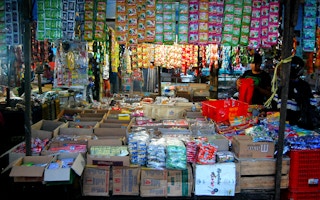From shampoo and toothpaste to detergent powder and instant coffee, plastic sachets are a common form of packaging in developing countries that have made household goods affordable for people with limited disposable income. But with hundreds of billions of them thrown away every year, these lightweight plastic sachets have become an environmental nuisance, clogging drains and polluting public spaces.
To continue reading, subscribe to Eco‑Business.
There's something for everyone. We offer a range of subscription plans.
- Access our stories and receive our Insights Weekly newsletter with the free EB Member plan.
- Unlock unlimited access to our content and archive with EB Circle.
- Publish your content with EB Premium.
To tackle this problem and close the loop on its sachet production, consumer goods giant Unilever yesterday announced that it has developed new technology to recycle used sachets and will make the technology available to peers and rivals.
Called the CreaSolv Process, the technology was jointly developed by Unilever and the Fraunhofer Institute for Process Engineering and Packaging IVV, a German firm specialising in packaging.
Amita Chaudhury, sustainable business director for Southeast Asia and Australasia, Unilever, told Eco-Business that the technology enables the company to recycle every part of a used sachet. “The sachets that are recycled through our plant will be 100 per cent recycled into another generation of plastic sachets, and the residue film can be used in creating other products, like plastic pallets.”
Unilever will test the commercial viability of CreaSolv by opening a pilot plant in East Java by end 2017. “Indonesia is one of the most critical markets in terms of sachets infiltrating ocean waste. It is also our biggest sachet market, and is a natural choice for us to locate the plant,” she said.
Close to one-third of all plastic manufactured ends up in the ocean, and Indonesia is the world’s second largest plastic polluter after China.
Chaudhury said that single-use sachets make quality brands affordable for people in markets such as Indonesia. But there is little financial incentive for companies to recovery or recycle such small individual amounts of plastic.
But the CreaSolv Process uses the same amount of energy used to produce 1 kilogram of virgin plastic to recover 6 kilograms of pure plastic polymer, according to Dr Andreas Mäurer, department head of plastic recycling at Fraunhofer IVV comment in a statement.
Within the CreaSolv process, the focus is on extracting the polyethylene plastic that constitutes 60 per cent of plastic sachets. The used sachets are shredded and mixed with a solvent. The mixture is then turned into a sludge and the solvent evaporated, and the resulting material made into polyethylene pellets identical to ones made of virgin material. Pellets can then reenter the production cycle to be made into new plastic film. The byproduct of the film can also be channelled into the production of other items.
Unilever, which owns brands including Dove soap and Knorr soups, is also working on establishing a waste collection scheme to collect the sachets, and is partnering with waste banks, retailers and the local authorities to do so. Unilever will also work with waste pickers, who form an important but informal part of waste management systems in Indonesia.
This is not the consumer goods giant’s first attempt to recycle plastic packaging. It has partnered Walmart for a recovery programme that gave people Unilever vouchers in exchange for their sachets in India, and in the Philippines offered text messaging credits in exchange for used plastic. Unilever has experimented with the use of sachets in fuel generation and cement production.
Earlier this year, the company pledged that all its plastic packaging would be reusable, recyclable or compostable by 2025.
There is a “clear economic case” for more circular production processes, Chaudhury said. She pointed to research that has found that 95 per cent of the value of plastic packaging is lost after its first use, which totals some $80-$120 billion.
“This creates huge economic inefficiencies for our industry. We believe that our commitment to making 100 per cent of our packaging recyclable will support the long-term growth of our business,” she said. CreaSolv is expected to help Unilever reduce the cost of packaging, she added.
Other multinationals have also made progress in recovering and recycling plastic waste. Unilever’s big rival Procter & Gamble announced it was making the world’s first recyclable shampoo bottle out of beach plastic in January 2017, and Adidas is putting its best foot forward with a line of sports shoes made from ocean waste.
By making the CreaSolv technology open source, Unilever hopes to “scale the technology with industry partners”, said David Blanchard, chief research and development officer, Unilever, in a statement.
Asked how Unilever benefited from sharing the technology, Chaudhury said: “At Unilever, we believe innovation is great, but when we can innovate to make a positive impact on the environment, like limiting plastic pollution, we have an obligation to share it.
“Our products will speak for themselves, but our future can only be secured if we work together.”








